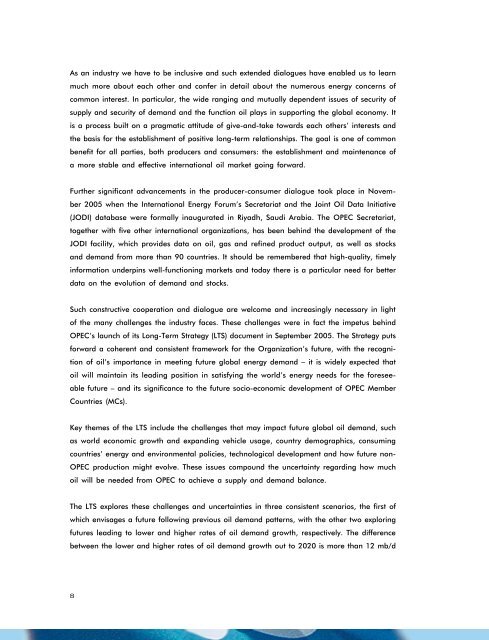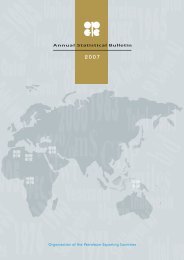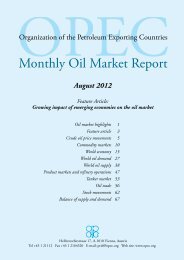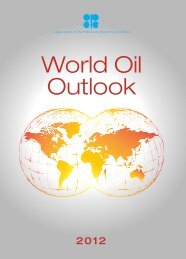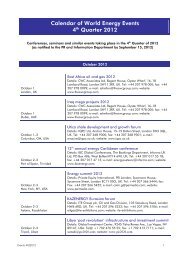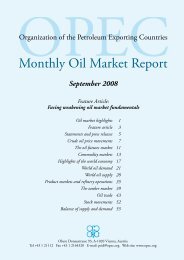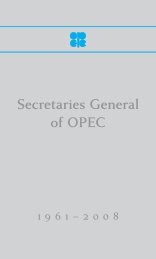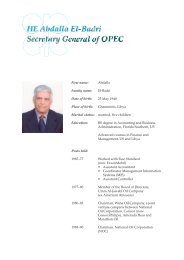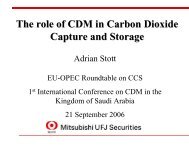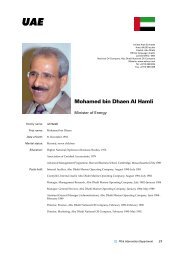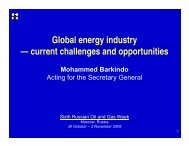2005 - OPEC
2005 - OPEC
2005 - OPEC
Create successful ePaper yourself
Turn your PDF publications into a flip-book with our unique Google optimized e-Paper software.
As an industry we have to be inclusive and such extended dialogues have enabled us to learn<br />
much more about each other and confer in detail about the numerous energy concerns of<br />
common interest. In particular, the wide ranging and mutually dependent issues of security of<br />
supply and security of demand and the function oil plays in supporting the global economy. It<br />
is a process built on a pragmatic attitude of give-and-take towards each others’ interests and<br />
the basis for the establishment of positive long-term relationships. The goal is one of common<br />
benefit for all parties, both producers and consumers: the establishment and maintenance of<br />
a more stable and effective international oil market going forward.<br />
Further significant advancements in the producer-consumer dialogue took place in Novem-<br />
ber <strong>2005</strong> when the International Energy Forum’s Secretariat and the Joint Oil Data Initiative<br />
(JODI) database were formally inaugurated in Riyadh, Saudi Arabia. The <strong>OPEC</strong> Secretariat,<br />
together with five other international organizations, has been behind the development of the<br />
JODI facility, which provides data on oil, gas and refined product output, as well as stocks<br />
and demand from more than 90 countries. It should be remembered that high-quality, timely<br />
information underpins well-functioning markets and today there is a particular need for better<br />
data on the evolution of demand and stocks.<br />
Such constructive cooperation and dialogue are welcome and increasingly necessary in light<br />
of the many challenges the industry faces. These challenges were in fact the impetus behind<br />
<strong>OPEC</strong>’s launch of its Long-Term Strategy (LTS) document in September <strong>2005</strong>. The Strategy puts<br />
forward a coherent and consistent framework for the Organization’s future, with the recogni-<br />
tion of oil’s importance in meeting future global energy demand – it is widely expected that<br />
oil will maintain its leading position in satisfying the world’s energy needs for the foresee-<br />
able future – and its significance to the future socio-economic development of <strong>OPEC</strong> Member<br />
Countries (MCs).<br />
Key themes of the LTS include the challenges that may impact future global oil demand, such<br />
as world economic growth and expanding vehicle usage, country demographics, consuming<br />
countries’ energy and environmental policies, technological development and how future non-<br />
<strong>OPEC</strong> production might evolve. These issues compound the uncertainty regarding how much<br />
oil will be needed from <strong>OPEC</strong> to achieve a supply and demand balance.<br />
The LTS explores these challenges and uncertainties in three consistent scenarios, the first of<br />
which envisages a future following previous oil demand patterns, with the other two exploring<br />
futures leading to lower and higher rates of oil demand growth, respectively. The difference<br />
between the lower and higher rates of oil demand growth out to 2020 is more than 12 mb/d


